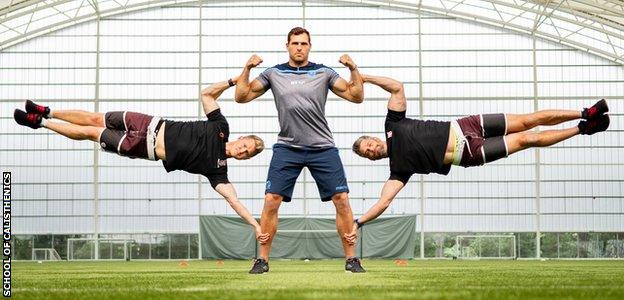David Jackson: Ex-rugby pro using calisthenics to help people stay active
- Published
Bodyweight training with the 'human flag’
A bleed on the brain left former professional rugby union player David Jackson feeling as if his mind was isolated from his body.
From being a try-scoring machine for Championship club Nottingham, Jackson was reduced to feeling like a "zombie" after sustaining a head injury during pre-season training in 2013.
The blow cost him his playing career. A repeat incident, doctors warned, could potentially be fatal.
For months, the once speedy back could no longer run without getting blurred vision and headaches.
Now, seven years on, he is using the experience of what it took to reinvent himself as a fitness coach to help people in self-isolation during the coronavirus pandemic.
"We have been specialising in bodyweight training for six years now and never has it been more important to share our expertise," Jackson told BBC Sport.
This is a 38-year-old whose business it now is to get the most out of the body's potential through calisthenics - a form of exercise that looks like a mash-up between yoga and parkour.
"It 100% saved me," Jackson said about discovering calisthenics while first training to be a strength and conditioning coach following his retirement as a rugby player.
"There was a period of five or six months where I wasn't feeling any better and I was wondering if I would ever improve.
"I couldn't look at the TV, couldn't read a book and I was worried because I couldn't imagine being able to work or to hold down a full-time job the way I was.
"I would have to nap every afternoon for two or three hours because of the fatigue - my brain was so tired from the damage that it needed time to recover and shutting me down to sleep is all it could do."
'The idea of trying a handstand gave me motivation'

David Jackson scored 102 tries in 316 appearances for Nottingham before retiring in 2013
Four months after being knocked out in training and having a seizure on the pitch, Jackson was told that he could no longer play contact sport.
But, as a player who always prided himself on his fitness and who later aspired to work in strength and conditioning, the gym was still a place where he could seek normality - or so he thought.
"I loved the gym and loved training and I thought I'd smash it once I could get back there," he said.
"I went straight back to weight training initially because that is all I knew and I found myself doing exactly what I would have done if my strength and conditioning coach was there telling me what to do.
"That was the catalogue of exercises and training that I knew and I soon got really bored, which I never thought would happen.
"I lacked motivation because my motivation was to be the best I could be for a game the following weekend."
Instead, it was watching a friend working on handstands that prompted Jackson to change his outlook on fitness.
"Just that idea of trying to do a handstand, having something to aspire to, gave me motivation," he said.
"Finding out what you could potentially do with your body was the new goal."
'We are about redefining people's impossible'
Jackson and his handstanding buddy Tim Stevenson eventually got so serious with their training that they eventually established the School of Calisthenics.
More than six years on, Jackson is the self-appointed "head of helping people be happy and human flags" - an exercise in which a person's body is pulled up and held parallel with the floor as they grip a pole.
While the gravity-defying feat is one of the "sexier" moves people can aspire to, alongside the handstand and frogstand, the exercise discipline is built on the fundamentals of human movement.
These are exercises and programmes that they have delivered for the Football Association and Scotland Rugby in recent years and which can be done in the front room, box room or bedroom, without equipment - not even a mat.

Tim Stevenson (left) and David Jackson perform the "human flag" with the help of former Scotland international Sean Lamont
With millions isolated because of the pandemic, the School of Calisthenics has made their 'Bodyweight Basics' programme, external free to access online, opened up their community forum to the public for hints and tips, and are putting on daily sessions to watch across a number of social media platforms.
Last year, more than 15,000 signed up to use their virtual classroom. That number has more than doubled in recent weeks as more people look to keep active from home.
And on Friday, they began a new programme to try to get people handstanding in isolation, with 10% of revenues generated from the virtual classroom - the online training platform - going to a charity that supports the National Health Service.
"Our messaging is normally about learning to move better, getting strong and having more fun with your bodyweight training," he said. "Right now it's about keeping moving and staying as healthy and happy as possible during this period.
"We are able to give some direction and help people at home move in a fun and enjoyable way.
"When people train with us they learn a lot about their body, where they are tight, where they are weak and where they are strong.
"For anyone keen to learn something new, who wants a goal and added purpose in training at home, then join us to learn to handstand."
Jackson encourages everyone to give it a try as he personally knows how daunting it is to see the calisthenics promoted with people doing the human flag.
"At first I thought people doing the human flag was all Photoshopped - it seemed impossible to me," he said. "But we are about redefining people's impossible.
"I started in a bad place. Granted, my training background meant when I was coming back into it, I wasn't doing so from ground zero.
"But because Tim and I started as beginners, we know the feeling of what it is like to try to learn this stuff.
"I remember attempting the frogstand for the first time - I face-planted at the gym in front of everyone and they laughed because I looked like an idiot.
"We have kept true to that feeling of being a beginner and that's why every exercise we do has three stages, with a regression or progression to make it easier or harder.
"Even if there is only one exercise that you get off the chair or out of the sofa to try, that is still infinitely more than zero and that's important when we are all at home like this."